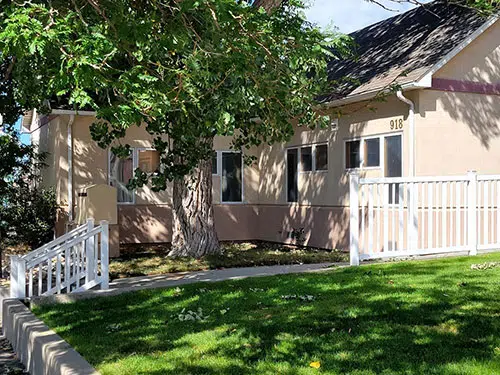Lawsuit Seeks to Block Wyoming’s Abortion Ban, Set to Take Effect Wednesday
If a court doesn’t intervene, virtually all abortions in the state would be criminalized and punishable by up to 14 years in prison
- Published In: Politics
- Last Updated: Jul 27, 2022

Pictured above is the Wellspring Health Access’ abortion clinic in Casper, Wyoming. Wellspring is one of the plaintiffs in a lawsuit that seeks to halt enforcement of the state’s near-total abortion ban, set to take effect Wednesday. The clinic was scheduled to open in June, but has faced a number of setbacks, including an arson attempt in May. (Courtesy photo of Wellspring Health Access)
By Jacob Gardenswartz
Special to the Wyoming Truth
A coalition of Wyoming abortion providers, state residents and a prominent abortion fund filed a lawsuit on Monday seeking to halt enforcement of the state’s near-total abortion ban, set to take effect Wednesday.
The complaint, filed in Teton County District Court, asks a judge to declare House Bill 92 — dubbed by plaintiffs the “Wyoming Criminal Abortion Ban” —unconstitutional and unenforceable in the state, as well as to issue temporary and permanent injunctions on state employees from carrying out the policy.
If allowed to go into effect, the law would cause “irreparable harm” to abortion providers and Wyomingites more broadly, the lawsuit argues, depriving them of “the right to be left alone by the government – especially when it comes to their private affairs such as family composition and decisions about their private healthcare.”

Representatives for Wyoming’s Republican Attorney General Bridget Hill declined to comment, citing ongoing litigation regarding the matter. The attorney general ruled on July 21 that the state’s law banning abortions was now enforceable, given the U.S. Supreme Court’s recent decision in Dobbs v. Jackson to eliminate the constitutional right to an abortion.
Michael Pearlman, communications director for Republican Gov. Mark Gordon, said in a statement: “Just as she does with all statutes when their constitutionality is challenged, the Attorney General will respond to this lawsuit and defend the legality of this law.”
In addition to several Wyoming residents and reproductive health medical professionals, plaintiffs also include Wyoming’s largest abortion fund, Chelsea’s Fund, and Wellspring Health Access, which is in the process of opening an abortion clinic in Casper. The lawsuit’s central argument relies on provisions in the Wyoming constitution, employing similar tactics used to challenge abortion bans in other states. With Roe v. Wade overturned, states are free to limit or ban abortions under federal law. But as Article 1, Section 38 of Wyoming’s state constitution notes, “Each competent adult shall have the right to make his or her own health care decisions.”
The plaintiffs argue that House Bill 92 — which makes performing abortion in Wyoming a felony, punishable by up to 14 years in prison, except in rare cases of rape, incest or health risks — stands in direct contradiction to that clause of the state constitution.
“It seems to me that it’s a credible argument,” said Robert Keiter, a professor of law at the University of Utah, who wrote a book on the history and interpretations of Wyoming’s constitution. “I think most people would agree that a decision to terminate a pregnancy is a part of healthcare in most instances.”
Among the plaintiffs named in the lawsuit is Danielle Johnson, a nurse and certified sexual assault examiner in Teton County. If the abortion ban goes into effect, Johnson would be “legally constrained from providing her pregnant patients with all available evidence-based health care which she is ethically and professionally obligated to provide,” according to the complaint, which could serve to “compromise her license and her livelihood.”
Kathleen Dow, a 26-year-old law student at the University of Wyoming who also signed on as a plaintiff, notes that she had an abortion to “protect herself after becoming pregnant in an abusive relationship.” A practicing conservative Jew, Dow wrote in a sworn affidavit that “under Jewish Law, an abortion to save the life of’ the mother is permitted and even mandated,” echoing arguments made in lawsuits in other states. “As a Jewish woman, it is an essential part of my faith that I have access to abortion,” she added.
The provision in the state constitution enumerating individuals’ health care rights was incorporated in a 2012 ballot initiative as a mostly symbolic gesture to push back against the Affordable Care Act’s health insurance mandate. But while the clause protects individuals’ health care rights, defenders of the abortion ban are already pointing to a subsection which gives the government the power to impose “reasonable and necessary restrictions” on those rights “to protect the health and general welfare of the people.”
In a speech Friday at a “Save Wyoming” rally of GOP politicians in Lander, Marti Halverson, president of the Wyoming Right to Life group, spoke at length about that clause, subsection (c). “We think that permits, indeed compels, the government of Wyoming to ban the murder of our fellow citizens before they are born,” she argued.
Halverson and others want the state’s abortion ban to go further, and they are pushing to eliminate the few exceptions to the prohibition. “Wyoming Right to Life will work to strike the rape and incest exceptions from House Bill 92,” she said Friday.
How exactly individuals who seek to receive an abortion under those exceptions should go about doing so is an open question. The law “provides no method for a health care provider to validate a claim of rape or incest,” according to the lawsuit. “Sexual assault survivors seeking abortion in Wyoming will be forced to choose between accessing services and maintaining their privacy in deciding whether to disclose the assault,” attorneys write.
However the Teton County judge rules, Keiter, the law professor, predicted the matter would make its way up to the state high court, the ultimate arbiter of matters pertaining to the state constitution.
“I have little doubt, given the prominence of the abortion decision question currently, that the matter will eventually end up in the hands of the Wyoming Supreme Court,” Keiter said.
He noted that court “has been willing over the years, very clearly, to grant Wyoming citizens greater rights under the equality and due process and unenumerated rights provisions in the state constitution than are available under the federal constitution.”













